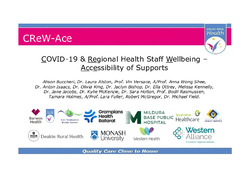Please use this identifier to cite or link to this item:
http://hdl.handle.net/11054/2309| Title: | CReW-Ace: COVID-19 & regional health staff wellbeing – accessibility of supports. |
| Author: | Buccheri, A. Alston, L. Wong Shee, Anna Isaacs, A. Bishop, J. Kennelly, M. McGregor, R. McKenzie, K. Ottrey, E. Jacobs, J. Holton, S. Rasmussen, B. Holmes, T. Fuller, L. Versace, Vincent Field, M. |
| Issue Date: | 2023 |
| Conference Name: | Western Alliance 2023 Symposium. |
| Conference Date: | November 21-22 |
| Conference Place: | Warrnambool, Victoria |
| Abstract: | Background/aim: Poor mental health and wellbeing in health service staff can adversely impact on workforce retention, quality of patient care and service provision. Compared to metropolitan health services, rural and regional health services are more likely to experience challenges recruiting, retaining and supporting their staff. Existing workplace wellbeing initiatives may not meet the specific needs of rural and regional health service workers, many of whom experienced psychological distress during the COVID-19 pandemic. Our earlier research, driven by rural and regional health services, explored factors influencing health service staff wellbeing during the COVID-19 pandemic, and identified a range of community, individual, health service and broader factors. This multi-site study seeks to further explore the experiences, barriers and enablers of rural and regional Victorian health service staff in providing and accessing workplace wellbeing supports. CReW-Ace objectives are to: facilitate the co-design of a survey to explore the experiences of rural and regional health service staff with workplace wellbeing supports; identify existing workplace wellbeing supports in rural and regional health services; identify barriers and enablers for rural and regional health service staff accessing and providing workplace wellbeing supports. Population/setting: CReW-Ace involves seven rural and regional Victorian public health services. Methods: The initial co-design phase consists of focus groups with members of health service leadership, human resources and staff wellbeing teams to discuss survey design and the needs of the participating sites. Thematic analysis of focus group responses will inform the development of an online staff survey that will gather rural and regional health service staff perceptions of existing workplace wellbeing supports, and gaps and opportunities for potential supports. Results/findings: Four focus groups have been conducted (n=16) with representatives from each participating health service. Preliminary results suggest that the response to the COVID-19 pandemic has created opportunities to implement novel workplace wellbeing supports. Key areas for inclusion in the staff survey include evaluating the effectiveness of wellbeing supports and identifying strategies to meet the diverse needs of the workforce. Conclusion: Study not completed. Translational impact/implications for future practice: The outcomes of this research will guide both recommendations and future intervention design for rural and regional health services to support the wellbeing of their employees. |
| URI: | http://hdl.handle.net/11054/2309 |
| Internal ID Number: | 02365 |
| Health Subject: | COVID-19 CORONAVIRUS REGIONAL HEALTHCARE SUPPORT |
| Type: | Conference Presentation |
| Appears in Collections: | Research Output |
Files in This Item:
| File | Description | Size | Format | |
|---|---|---|---|---|
| WA_symposium_presentation_CReW-Ace.pdf | 491.31 kB | Adobe PDF |  View/Open |
Items in DSpace are protected by copyright, with all rights reserved, unless otherwise indicated.
